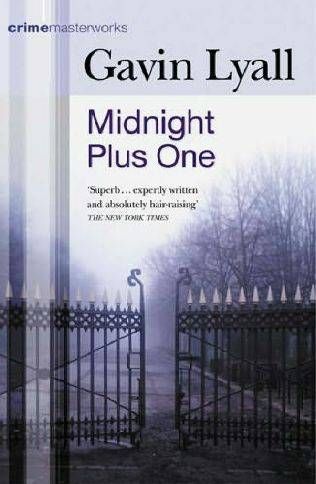"Midnight Plus One" - читать интересную книгу автора (Lyall Gavin)
 |
Gavin Lyall
Midnight Plus One
ONE
It was April in Paris, so the rain wasn't as cold as it had been a month before. But still too cold for me to walk through it just to see a fashion show. I wouldn't find a taxi until it had stopped raining, and when it stopped I wouldn't need one: I only had a few hundred yards to go. Impasse.
That left me sitting in the Deux Magotsgetting wet only on the inside and listening to the evening traffic making angry Grand Prix starts from the lights on the Boulevard St Germain outside.
The caféclaimed it was the Rendez-vous de l'élite intellectuelle, but it was the quiet time when most of theélitehad gone off to wave their arms and egos over dinner. The only other customer I could see without turning my head was a young gent in a green corduroy suit and mauve denim shirt, but he obviously wasn't reallyintellectuellebecause he was reading the continental edition of the Daily Mail. The front page was getting excited about the setting up of another enquiry into British security leaks. I stayed calm; all it meant was that another half-dozen retired civil servants and judges were going to be told secrets they wouldn't have known otherwise.
The loudspeaker on the wall said:'Monsieur Caneton, Monsieur Caneton. Téléphone, s'il vous plait.'
Ask me what my wartime code-name was and I'd need a moment to remember. Broadcast it over a caféloudspeaker in Paris and I know immediately who you mean. The back of my neck felt cold, as if somebody had touched it with a gun muzzle.
I finished taking a sip of Pastis, which I found I'd been in the middle of, and started thinking what to do. In the end, I did the only thing possible: went to answer it. Whoever-it-was must already know I was there. He couldn't have been ringing the Deux Magots twice a day since 1944 on an off-chance The telephones are downstairs, near thetoilettes', two wooden booths with small porthole windows. I could see somebody's back view in one; I picked up the other phone and said:'Allo?'
'C'est Monsieur Caneton?' said whoever-it-was.
'Non,' I said. 'Je ne connais pas Monsieur Caneton. Qui est là?' If he wanted to play by the old rules, he'd get 'em. You never admitted to knowing anybody, let alone being them.
All he did was chuckle. Then he said, in English: 'I am an old friend. If you meet Monsieur Caneton, please you tell him that Henril'avocatwishes to talk with him.'
'And where would he find Henri the lawyer?'
'In the next telephone box.'
I dumped the phone, stepped out, and yanked open the next door. And there he was, wearing a malicious grin that stretched from side to side of the booth.
'You bastard,' I said. 'You sadistic bastard.' I wiped the back of my neck.
The grin flowed out of the booth towards me. Behind it was a shortish tubby man in a crisp white raincoat, curly grey hair, a deep fat face with bright grey eyes behind rimless glasses, and the sort of moustache that could have been just a moment's forgetfulness in shaving.
Henri Merlin, Paris lawyer. And one-time Resistance paymaster.
We shook hands, using all four of them. It was ten years since we'd met and I hadn't seen much of him since the end of the war. He'd aged – he was well into his fifties – but elegantly and, it seemed, prosperously.
'You have not forgotten everything, then,' he beamed. 'Even the accent is not too horrible.'
'The accent's bloody good.' Good enough to keep me alive in France for three years in the war – and a sight better than his English. But on a second thought, I wondered if his English might not be deliberately stagey. American and British businessmen or lawyers might ease up a little once they had him spotted as that familiar type, the gay, flippant musical-comedy boulevardier. Top Paris lawyers are as gay and flippant at work as the men who cut diamonds for a living.
Then I remembered I had a living to make, too. 'Can't stop now, Henri. Can I see you later?'
He stretched a fat hand towards the stairs. 'We go together. We are enemies.' He grinned again.
'You'rein on this case?'
'Naturellement. You see how determinedle Maîtreis this time? – he now has the best of all Paris lawyers. This time weprove your Mercedes Melloney is stealing the – themodèles' -he held out his raincoat like a skirt while he searched for the word – 'the dress designs (you see? in England you do not even have a word for it) – the designs ofle Maître. We prove it. You pay us one million francs. Then we have dinner – and we talk about a job I have for you.'
'We'll take it to court,' I said. But he was already bouncing up the stairs.
He stopped halfway and looked down at me. 'You are not perhaps Caneton any more? Not withl'Intelligencenow?'
'Not Caneton. Just Lewis Cane.'
'Louis.' He gave it the French pronunciation. 'With all these years, I did not know your real name. We go to see the horrible fashions of Mercedes Melloney.' He accelerated upstairs.
| © 2025 Библиотека RealLib.org (support [a t] reallib.org) |